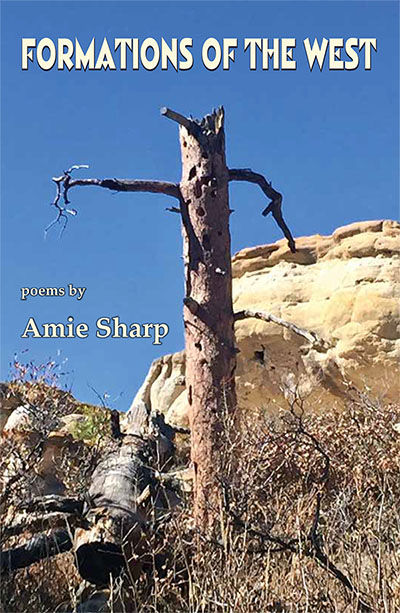Formations of the West
poems by
Amie Sharp
~68 pages, $14 (+ shipping)
Projected Release Date: August/Sept, 2024
An Advance Sale Discount price of $10 (+ shipping) is available HERE prior to press time. This price is not available anywhere else or by check. The check price is $14/book (which includes shipping & sales tax) and should be sent to: Main Street Rag, 4416 Shea Lane, Mint Hill, NC 28227.
PLEASE NOTE: Ordering in advance of the release date entitles the buyer to a discount. It does not mean the book will ship before the date posted above and the price only applies to copies ordered through the Main Street Rag Online Bookstore.
 Amie Sharp is the author of The Sabine Women, winner of the Emergence Chapbook Prize from Red Dragonfly Press. She was a 2018 artist-in-residence at the Sabina Cultural Association in Casaprota, Italy. Her work has been nominated for a Pushcart Prize and Best of the Net, and appeared in Atticus Review, Badlands, the Bellevue Literary Review, Burningword, and Tar River Poetry, among others. She was named one of the “Best 64 Poets of 2018” by Black Mountain Press, is a member of the Colorado Poets Center, and an associate professor of English at Pikes Peak State College.
Amie Sharp is the author of The Sabine Women, winner of the Emergence Chapbook Prize from Red Dragonfly Press. She was a 2018 artist-in-residence at the Sabina Cultural Association in Casaprota, Italy. Her work has been nominated for a Pushcart Prize and Best of the Net, and appeared in Atticus Review, Badlands, the Bellevue Literary Review, Burningword, and Tar River Poetry, among others. She was named one of the “Best 64 Poets of 2018” by Black Mountain Press, is a member of the Colorado Poets Center, and an associate professor of English at Pikes Peak State College.
In Formations of the West, Amie Sharp paints intricate pictures of the mundane and the sacred with an even hand, like life itself: towns, canyons, artists, mothers. There is no preaching here, no instructions. In “Spider Remembers,” the speaker has two desires: “Survive, and then create.” Through the poet’s eyes, we glimpse visions of how to do both. ~Brook Bhagat, author of Only Flying
West Tennessee, 1980
Small-town storefronts leaned over sidewalks,
their signs bent and clattering in rain.
In summer a wet heat coiled in the soybean
furrows and in the troughs of grunting pigs.
Couples spent warm nights shucking
ears of corn, a silken-gold undressing.
Tractors sawed the fields, skidding over dips
in farmland, engines churning blades
into green blurs. Banded hay bales dropped
like pillows on meadows of acrid grass.
The sky flung persimmon clouds behind
the small hills, and everywhere the roads
mouthed sentinel lines of maple and pine.
Next door our neighbor packed his great oak
with concrete once he saw lightning
had riven its trunk. I was a child, and my questions
were about the dew and how it fell.
The Minister’s Last Morning
“He asked me ‘Why?’ I just said I was sorry.”—Mary Winkler
In Tennessee, morning clouded. Gray light fell
as the dirt-water day began its crawl, crib to tomb.
Whatever the secrets, the house can’t tell.
The young wife lifted the shotgun, loaded with shell.
Blank as a child, she’d tell the court she felt a strange boom
as the morning clouded, and gray light fell
through the ruffled bedrooms the girls knew so well.
How much did they hear as his red back bloomed?
Whatever the secrets, the house can’t tell.
His parents keep the girls, but fear soon she’ll
walk—a brief sentence gaveled in the courtroom.
When the morning clouded and gray light fell,
that she’d endured forced sex, pain towering well
beyond rage against the man who was her groom—
whatever the secrets, the house can’t tell.
She buckled the girls in, slammed the door like a cell.
The phone ripped free, he finished bleeding in their room.
Outside, the morning clouded and gray light fell
on whatever secrets the house can’t tell.
Shooter
I know something you don’t.
How it feels to ease the rifles
from my father’s gun cabinet
into the camouflage duffel bag.
To sit at the table and ask
my sister about her shift, my heart
consumed with secret hammering.
I know what it is to be low,
the small one. To feel a vanishing
for those who say they love me
but do not imagine what I could do.
Schoolmates talk over me, my mother’s
eyes bore past my videogame’s
blood-drenched screen to her own
worries, but these are not reasons.
Reasons float beneath my deadpan
voice, speed my dream of bodies
shuddering before me as I cross
to a place where evil is both engine
and afterthought, where motives,
like victims, might as well not exist.
Prayers
Listen: there’s a hell
of a good universe next door; let’s go. —E.E. Cummings
Someone’s scorching brakes hold.
Prognosis: Good. They’ve caught it
in time. A 50-foot kick sails through
the uprights as the clock strikes zero.
Elsewhere, the tsunami rolls its crashing
curtain over a village
the pious seldom remember.
The burned child’s morphine
drips its staccato of haze,
and a mother wonders why
someone assures her everything
happens for a reason.


 Amie Sharp is the author of The Sabine Women, winner of the Emergence Chapbook Prize from Red Dragonfly Press. She was a 2018 artist-in-residence at the Sabina Cultural Association in Casaprota, Italy. Her work has been nominated for a Pushcart Prize and Best of the Net, and appeared in Atticus Review, Badlands, the Bellevue Literary Review, Burningword, and Tar River Poetry, among others. She was named one of the “Best 64 Poets of 2018” by Black Mountain Press, is a member of the Colorado Poets Center, and an associate professor of English at Pikes Peak State College.
Amie Sharp is the author of The Sabine Women, winner of the Emergence Chapbook Prize from Red Dragonfly Press. She was a 2018 artist-in-residence at the Sabina Cultural Association in Casaprota, Italy. Her work has been nominated for a Pushcart Prize and Best of the Net, and appeared in Atticus Review, Badlands, the Bellevue Literary Review, Burningword, and Tar River Poetry, among others. She was named one of the “Best 64 Poets of 2018” by Black Mountain Press, is a member of the Colorado Poets Center, and an associate professor of English at Pikes Peak State College.